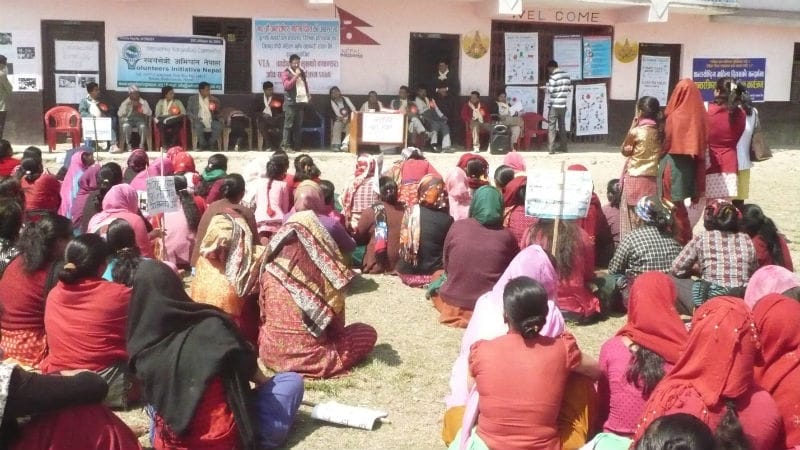On the occasion of 106th international women’s day, it was organized a specialist women’s health camp in Jitpurphedi. The camp was organized by Jitpurphedi Women agriculture co-operative limited in coordination with Tulsi Memorial Cancer relief foundation. The camp was targeted to 200 women from Jitpurphedi. It was based on VIA (Visual inspection with acetic acid) to detect pre-cancerous lesions of Cervix. It was a cancer screening test targeted to women, where 100 women from Jitpurphedi were benefited. Among them many women were found with polyp, uterus prolapse and infections with five positive cases for VIA (suspected with pre-cancerous lesions). Women were advised for the treatment according to the cases. Those women who were detected positive for VIA were advised to go to hospital for further confirmative test.
Cervical cancer is the most common cancer among women in Nepal. There is a high mortality due to cervical cancer among women. Primary prevention, early detection through increased awareness, organized screening programme, diagnosis and treatment are four components of cervical cancer control. Progression from cervical lesions to invasive cancer is a slow process and most often it is asymptomatic in its early stages. Therefore an early detection and treatment of these asymptomatic lesions can only be possible if women are given opportunity to have cervical cancer screening at an early stage. According to WHO, screening is a public health intervention used on a population at risk, or target population to identify individuals with high probability of having or developing a disease but not undertaken to diagnose a disease. Thus screening is the process by which a test is applied to select out asymptomatic individuals at risk of having or developing a certain disease. Several tests such as Visual inspection with acetic acid (VIA), Visual inspection with Lugol’s iodine (VILI), Human Papilloma virus deoxyribonucleic (HPV DNA) test and Pap smear test can be used in screening for cervical cancer. VIA involves performing a vaginal speculum exam during which a health care provider applies dilute (3- 5%) acetic acid (vinegar) to the cervix. Abnormal tissue temporarily appears white when exposed to vinegar. Viewing the cervix with the naked eye to identify color changes on the cervix. Determining whether the test result is positive or negative for possible precancerous lesions or cancer.
In the camp organized in Jitpurphedi VIA was adopted. It was done in 100 women by an expert team led by gynecologist and cancer expert Dr Jitendra Pariyar. In the inauguration program Dr Jitendra explained about VIA technology. He has focused on cancer prevention. He advised women not to smoke and keep the perineum area clean. He shared that cancer is common to those women who get early marriage, who has more sexual partner, who give births to more children and smokes. He said that VIA is the technology which is useful to detect the precancerous lesion in early stages mostly adopted in poor health settings. He was grateful to get this opportunity to serve women in women’s day. Similarly Dr Laxmi from volunteers Initiative Nepal has explained about importance of cancer screening test. He emphasized women to follow preventive techniques from cancer and suggest them to change diet habit and exercise. He remembered about health activities that VIN was organizing in Jitpurphedi. He requested more women to get participated in health camp. From organizer point of view Parshuram Aryal from Jitpurphedi, expressed his sincere gratitude to medical team, guests and women for their valuable time in the camp.


